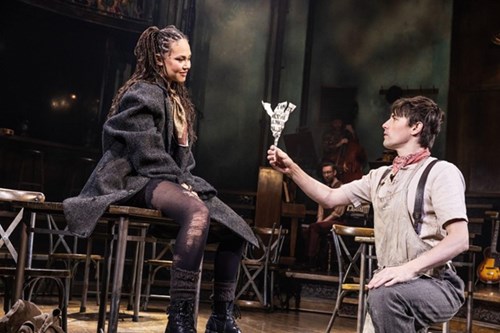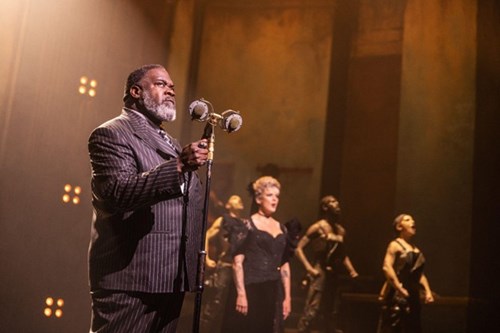In the heart of New York City, the lights of Broadway shine bright, illuminating tales of love, loss, triumph, and tragedy. Among the plethora of shows, Hadestown is a unique gem, weaving together two distinct love stories from Greek mythology with a soulful, folk-inspired score. Inspired by the ancient myths of Orpheus and Eurydice, and Hades and Persephone, Hadestown is a poetic exploration of love in its many forms, set against the backdrop of a post-apocalyptic depression-era town. The musical, conceived and written by Anaïs Mitchell and directed by Rachel Chavkin, has captured audiences' hearts since it first premiered Off-Broadway in 2016, and its Broadway debut in 2019 only solidified its position as a modern classic.
At the center of Hadestown are two couples, each representing a different facet of love. The young lovers, Orpheus and Eurydice, embody the idealistic, passionate love of youth, while the older couple, Hades and Perphephone, reflect a more mature, complicated love that has weathered the test of time and conflict. Orpheus, the idealistic poet, and Eurydice, the pragmatic young woman, find their love tested by poverty and desperation. On the other hand, Hades, the ruthless king of the Underworld, and Persephone, the goddess of spring, grapple with issues of power, freedom, and compromise in their millennia-old marriage. Hadestown masterfully interweaves these two narratives, creating a rich tapestry of love, sacrifice, and resilience that resonates deeply with audiences.
Orpheus, portrayed as a dreamy musician, is the embodiment of idealistic love. His belief in the power of love and music is unshakeable, and he pours his heart into his songs, hoping they will create a better world. Eurydice, on the other hand, is pragmatic and worldly. She is drawn to Orpheus' optimism and purity, but her experiences have taught her to be cautious and self-reliant.
Their love story begins with a lyrical spark, the two drawn together by Orpheus' hopeful melodies. However, the bliss of their initial connection is short-lived. The harsh realities of poverty and a constant struggle for survival, put a heavy strain on their relationship. Eurydice, driven by desperation, makes a tragic decision to leave for Hadestown, leading to the heartbreaking climax of their story. Orpheus' attempt to rescue Eurydice from the underworld ends in failure, a poignant testament to the tragic consequences of mistrust and fear.
Their key songs, most notably "Wait for Me," serve as musical reflections of their journey. The song is a plea from Orpheus to Eurydice, a promise that he will find his way back to her. The haunting melody and heartfelt lyrics beautifully encapsulate the pain of their separation and the depth of their love.

While the story of Orpheus and Eurydice in Hadestown closely follows the original Greek myth, it also offers a fresh reinterpretation. In Hadestown, Eurydice's decision to go with Hades is a result of her own desperation emphasizing the societal pressures that drive individuals to make tragic choices, and making the story more relevant to contemporary audiences.
In contrast to the youthful idealism of Orpheus and Eurydice, Hades and Persephone represent a seasoned love that has been tested by time, power, and separation. Hades, the hardened ruler of the underworld, is a character of strength and authority, but beneath his tough exterior is a man deeply in love with his wife. Persephone, the goddess of spring, is vibrant, spirited, and independent. She loves Hades but resents the confines of the underworld and yearns for the freedom and vitality of her earthly realm.
The love story of Hades and Persephone is one of separation and longing, followed by reunion. Bound by an agreement that requires Persephone to spend half of the year in the underworld and the other half on earth, the couple's love is marked by periods of intense longing followed by passionate reunions. However, their relationship is strained by Hades' obsession with power and Persephone's desire for freedom, creating a tension that reflects the complexity of their love.
Their relationship is encapsulated in their key songs, "Hey, Little Songbird" and "How Long?". "Hey, Little Songbird," sung by Hades to Eurydice, reflects his manipulation and power, but also echoes his own longing for Persephone. "How Long?", a duet between Hades and Persephone, is a powerful exploration of their complex relationship. The song captures their yearning for each other, their disagreements, and their enduring love, signifying the essence of their seasoned, complicated relationship.
Hadestown stays true to the original Greek myth of Hades and Persephone in many ways, but also brings fresh nuances to their story. The musical delves deeper into the dynamics of their relationship, exploring themes of power, compromise, and emotional longing that are only touched upon in the myth. While the myth paints Hades as a villain who abducts Persephone, Hadestown portrays him as a deeply flawed, but ultimately loving husband. It's this complex portrayal of Hades, along with Persephone's vibrant independence and their emotionally charged relationship, that makes their love story in the show resonate with modern audiences.

What makes Hadestown truly remarkable is the interplay between the two love stories of Orpheus/Eurydice and Hades/Persephone. The narratives intersect and mirror each other in fascinating ways, creating a dynamic interplay of themes, emotions, and music. They exist in parallel, their stories unfolding simultaneously and influencing one another. For instance, the tragic fate of Orpheus and Eurydice is foreshadowed by the strained relationship between Hades and Persephone. Similarly, the reunion of Hades and Persephone provides a stark contrast to the tragic separation of Orpheus and Eurydice, reinforcing the emotional impact of both narratives.
Hadestown masterfully balances the idealism of Orpheus/Eurydice's love with the realism of Hades/Persephone's relationship. Orpheus and Eurydice's love is characterized by youthful passion and idealism, their belief in the power of love is both beautiful and tragic in its naivety. Conversely, Hades and Persephone's love is marked by maturity, compromise, and a sense of realism borne out of their long, complicated history. This balance serves to highlight the different facets of love and the challenges that come with it, whether it's the hopeful idealism of youth or the seasoned pragmatism of maturity.
These love stories resonate deeply with audiences because they reflect our own experiences with love. They remind us of the exhilarating rush of young love, the struggles and compromises of mature relationships, the pain of loss, and the enduring nature of longing. They capture the universal human experience of love in all its beauty and tragedy.
In its portrayal of two love stories, Hadestown explores universal themes of love — its transformative power, its capacity for pain, and its enduring nature. The show reminds us that love, in all its forms, is a fundamental part of the human experience. Whether it's the idealistic love of Orpheus and Eurydice or the seasoned love of Hades and Persephone, Hadestown captures the essence of love in a way that is both timeless and profoundly relevant to our modern world.
If you haven't yet experienced this masterful retelling of ancient love stories, consider seeing Hadestown on Broadway. It's more than just a musical — it's an exploration of love, loss, and longing that will resonate with anyone who has ever loved. So come, as the song goes, "Way down, Hadestown, way down under the ground" and lose yourself in the emotional journey of these timeless love stories. Whether you're a fan of Greek mythology, a lover of musical theatre, or simply a romantic at heart, Hadestown promises an unforgettable experience.









